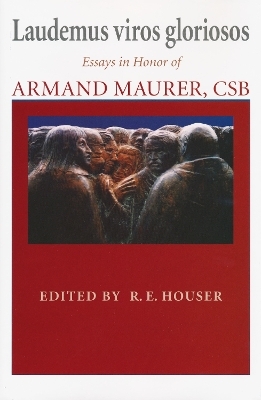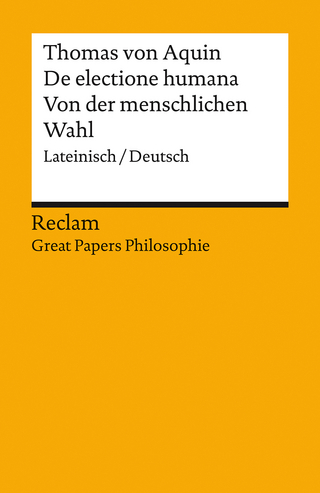
Laudemus viros gloriosos
Essays in Honor of Armand Maurer, CSB
Seiten
2007
University of Notre Dame Press (Verlag)
978-0-268-03103-9 (ISBN)
University of Notre Dame Press (Verlag)
978-0-268-03103-9 (ISBN)
The authors of these fifteen essays are united in a common love of medieval thought and a common appreciation of philosophizing through the study of the history of philosophy.
This book of fifteen essays is presented in honor of one of the premier historians of medieval philosophy, Armand Maurer of the Pontifical Institute for Mediaeval Studies and the University of Toronto. The authors, internationally recognized scholars in the field of medieval philosophy and theology, are friends, colleagues, and students of Fr. Maurer. They are united in a common love of medieval thought and a common appreciation of philosophizing through the study of the history of philosophy. Their interests and methodologies, however, are diverse, and cover a range from Justin Marytr, who died during the reign of Marcus Aurelius, to Bartholomew Mastrius, a contemporary of Descartes.
The contributions are arranged chronologically, beginning with John Rist’s essay on Christian philosophy during the patristic era. Richard Taylor demonstrates the importance of Arabic philosophical thought for the Latin West during the scholastic era, which began in the thirteenth century. R. James Long treats the early scholastics Richard Fishacre and Richard Rufus. Following Maurer’s central interest, the majority of the essays (by R. E. Houser, Leo Elders, Lawrence Dewan, David B. Twetten, Mary C. Sommers, and James P. Reilly) treat aspects of the thought of Thomas Aquinas. But just as Maurer did not confine himself to Aquinas, this volume reaches out to other thirteenth-century figures and topics. John Wippel looks at Godfrey of Fontaines, Timothy B. Noone studies the Franciscans Matthew of Aquasparta and Peter John Olivi, and Stephen Brown adds the Franciscan Peter of Candia. Reflecting Maurer’s own interests in fourteenth-century philosophy are the contributions of Calvin Normore on logic and Girard Etzkorn on the Franciscan Francis of Mayronis. The essay by Norman Wells focuses on the Franciscan Batholomew Mastrius. The volume concludes with a wonderful autobiography of his education by Maurer himself and a biliography of Maurer’s writings.
This book of fifteen essays is presented in honor of one of the premier historians of medieval philosophy, Armand Maurer of the Pontifical Institute for Mediaeval Studies and the University of Toronto. The authors, internationally recognized scholars in the field of medieval philosophy and theology, are friends, colleagues, and students of Fr. Maurer. They are united in a common love of medieval thought and a common appreciation of philosophizing through the study of the history of philosophy. Their interests and methodologies, however, are diverse, and cover a range from Justin Marytr, who died during the reign of Marcus Aurelius, to Bartholomew Mastrius, a contemporary of Descartes.
The contributions are arranged chronologically, beginning with John Rist’s essay on Christian philosophy during the patristic era. Richard Taylor demonstrates the importance of Arabic philosophical thought for the Latin West during the scholastic era, which began in the thirteenth century. R. James Long treats the early scholastics Richard Fishacre and Richard Rufus. Following Maurer’s central interest, the majority of the essays (by R. E. Houser, Leo Elders, Lawrence Dewan, David B. Twetten, Mary C. Sommers, and James P. Reilly) treat aspects of the thought of Thomas Aquinas. But just as Maurer did not confine himself to Aquinas, this volume reaches out to other thirteenth-century figures and topics. John Wippel looks at Godfrey of Fontaines, Timothy B. Noone studies the Franciscans Matthew of Aquasparta and Peter John Olivi, and Stephen Brown adds the Franciscan Peter of Candia. Reflecting Maurer’s own interests in fourteenth-century philosophy are the contributions of Calvin Normore on logic and Girard Etzkorn on the Franciscan Francis of Mayronis. The essay by Norman Wells focuses on the Franciscan Batholomew Mastrius. The volume concludes with a wonderful autobiography of his education by Maurer himself and a biliography of Maurer’s writings.
R. E. Houser is professor of philosophy at the University of St. Thomas and the Center for Thomistic Studies. He is the author and editor of a number of books, including The Cardinal Virtues: Aquinas, Albert, Philip the Chancellor.
| Erscheint lt. Verlag | 31.3.2007 |
|---|---|
| Reihe/Serie | Thomistic Studies |
| Zusatzinfo | 1 Halftones, unspecified |
| Verlagsort | Notre Dame IN |
| Sprache | englisch |
| Maße | 152 x 229 mm |
| Gewicht | 712 g |
| Themenwelt | Geisteswissenschaften ► Philosophie ► Philosophie des Mittelalters |
| ISBN-10 | 0-268-03103-7 / 0268031037 |
| ISBN-13 | 978-0-268-03103-9 / 9780268031039 |
| Zustand | Neuware |
| Haben Sie eine Frage zum Produkt? |
Mehr entdecken
aus dem Bereich
aus dem Bereich
Buch | Softcover (2024)
Reclam (Verlag)
CHF 11,90
Redewendungen aus der Natur
Buch | Hardcover (2024)
Regionalia Verlag
CHF 11,10
von der menschlichen Wahl
Buch | Softcover (2024)
Phillip Reclam (Verlag)
CHF 10,35


